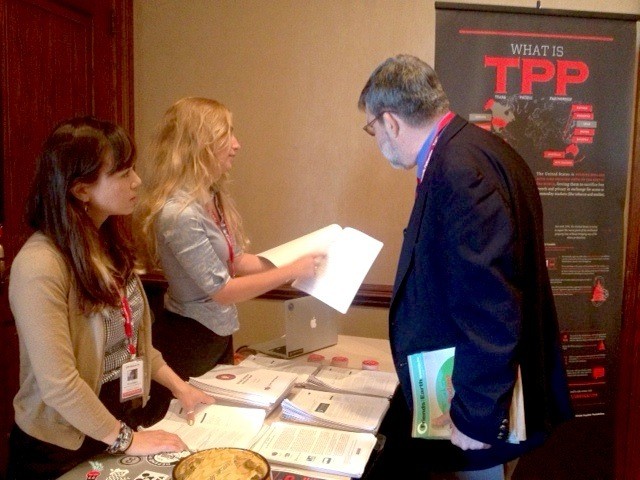Reporting back: OpenTheTPP.net & the Virginia negotiations
Last week, negotiators and trade representatives behind the Trans-Pacific Partnership (TPP) trade agreement met in Virginia for another round of discussions. Once again, citizens of the pro-Internet community were left out of these secretive negotiations and public interest groups had their opportunities to speak out allocated in a series of 10-minute ‘stakeholder presentations’. These presentations came with heavy criticism from our on-the-ground partners, with Public Knowledge even comparing the setup to a ‘science fair’ where stakeholders would have to compete in drawing attention to their booths and EFF noting that TPP officials refused to even comment on provisions in leaked TPP documents. The lack of a clearly defined mandate for the presentations resulted in much confusion and less opportunity to engage with negotiators. A member of Public Knowledge had this to say: Often I saw negotiators and stakeholders watching from just outside the doorway of the rooms. Also, because the rooms were so close together and their doors were all open, the noise from other rooms or the hallway sometimes distracted from the presenters, who did not have microphones.
Instead of adhering to another set of confining rules laid out by the TPP, we took a radically different approach to ensure your voices were heard. With OpenTheTPP.net, we extended our campaign against the Trans-Pacific Partnership in an effort to push open the closed-door meetings regarding our Internet freedom by inviting citizens to submit their messages to negotiators.
According to reports from our coalition members on-the-ground at the TPP negotiations, trade representatives definitely took notice of the citizen comments streaming into their meeting space.
Arthur of Citizen Trade Campaign, an on-the-ground partner, exclaimed that the efforts of citizens worldwide in opening the TPP were successful in getting our message across:
It sent a clear message to negotiators that people throughout North America and beyond are watching what they're doing and are unhappy with the direction in which the negotiations appear to be heading. Thank you OpenMedia and all the citizens who took part in this initiative!
The process of inserting citizen voices into negotiators’ meeting space was itself a statement, one that signified our expectation to have any rules impacting our Internet use to be made in a way that is transparent. Ideally we the Internet users would and should drive the process behind these decisions, not media conglomerates who wish to protect their outdated business models.
Your voices created leverage for the policy experts some of our coalition members had on hand to deliver detailed presentations, such as one from Public Knowledge that laid out the groundwork for balanced copyright rules.
Beyond your messages, pictures, and opinions submitted through our OpenTheTPP.net tool, trade negotiators were often confronted by protests that would criticize a broad spectrum of the TPP’s extensive implications. On Tuesday, September 11, anti-TPP protesters blocked access to their meeting space after becoming increasingly frustrated with the secrecy surrounding negotiations. Our coalition partners at the Council of Canadians provide a great rundown of not only these acts against the TPP, but how your voices were able to cross into discussion.
In spite of our combined efforts and your inspired messages, the lobbyists behind the TPP seem committed to pushing forward. According to reports in the stakeholder briefing, USTR officer Barbara Weisel said Canada and Mexico will officially join the Trans-Pacific Partnership beginning of October 8.
We’re beginning to see citizens worldwide criminalized for leaving their personal network open, the U.S. Patent and Trademark Office blocking access to pro-Internet content and the warrantless online spying bill still rearing its ugly head, threatening our Internet freedom. But at the same time, the pro-Internet community is pooling their resources and creating innovative tools, like OpenTheTPP.net, to ensure that the Internet freedom dialogue continues.
*Check out a rundown of our Open The TPP initiative and some of the best citizen comments below:





 Take action now!
Take action now!
 Sign up to be in the loop
Sign up to be in the loop
 Donate to support our work
Donate to support our work